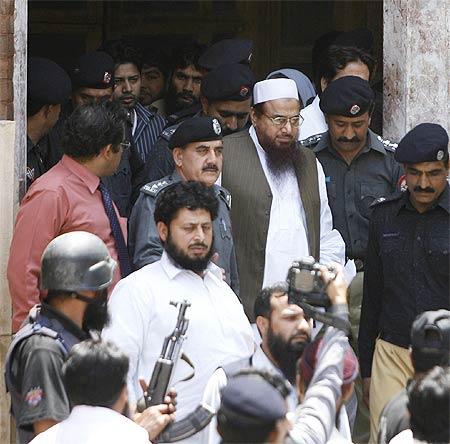'It is very significant that the president and the prime minister discussed Pakistan's efforts to take action against Lashkar-e-Tayiba and its affiliates.'
'This is something new and it demonstrates a recognition of Pakistan of the threats these terrorist groups pose to Pakistan and pose to other countries.'
Aziz Haniffa/Rediff.com reports from Washington, DC.
 The security and safety of Pakistan's nuclear arsenal featured in the conversation between US President Barack Obama and Prime Minister Nawaz Sharif on Thursday, October 22, at the White House, a senior administration official has acknowledged.
The security and safety of Pakistan's nuclear arsenal featured in the conversation between US President Barack Obama and Prime Minister Nawaz Sharif on Thursday, October 22, at the White House, a senior administration official has acknowledged.
"I would say more generally, the United States urges all nuclear capable States, including Pakistan, to exercise restraint regarding nuclear weapons and missile capabilities," the official, who was in on the meeting, briefing Indian journalists on background, noted.
"In particular," he explained, "we have discussed efforts to strengthen safety and security measures for Pakistan and to continue to hold regular discussions between Pakistan and the United States on these issues."
"So, we discussed this now, but this is part of an ongoing process where we did discuss these issues with Pakistan and express our concerns to them."
"Most recently," the official added, "the dialogue where this was discussed prior to this trip was the security and strategic stability of the Nonproliferation Working Group, which met in Washington in June."
Asked if considering the paranoia about the safety and security of Pakistan's nuclear weapons in light of the terrorist groups operating within its borders and their avowed intent to acquire nuclear capability -- even in the form of a 'dirty bomb' -- if the US was upping the ante vis-a-vis assistance to protect this arsenal, the official hastened to say "there is nothing new."
"We have had a long-standing dialogue with Pakistan about its nuclear programme and various developments in those programmes," he said, "and we are particularly concerned and have expressed those concerns to Pakistan that it is the requirement of all countries possessing nuclear weapons to ensure the safety and security of those weapons and to do everything it can to promote strategic stability."
The official expressed confidence that Pakistan has the wherewithal to protect these weapons from terrorist groups out to get them even in some crude form.
"It is our understanding that the government of Pakistan is very well aware of the full range of potential threats to its nuclear arsenal, including from terrorist groups operating on its soil." The official acknowledged that "other Pakistani military facilities have been attacked, and, of course, there have been countless attacks against civilians and leaders of Pakistan by terrorists."
"They (the Pakistani leadership)," he reiterated, "are well aware of the terrorist threat, including to all of their military installations and it is our understanding that they really have a dedicated security apparatus that understands the importance of nuclear security."
Wwith reference to Islamabad's commitment to go after terrorist groups like Lakshar-e-Tayiba, responsible for the horrific terrorist carnage in Mumbai on 26/11, which was contained in the US-Pakistan joint statement released after the Obama-Sharif summit, the official acknowledged, "This is indeed something very new."
According to the joint statement, Pakistan promised to take 'effective action against United Nations-designation terrorist individuals and entities, including Lashkar-e-Tayiba and its affiliates, as per its international commitments and obligations.'
"Of course, the United States has been discussing our concerns about terrorism throughout the region with Pakistan, really going back before 9/11," the official declared. "This has led to counter-terrorism cooperation with Pakistan over the years."
"But we have had a significant shift in Pakistan after the tragic attacks against the school in Peshawar in December 2014 in which 140 people were killed," he said. "Pakistan subsequently has established a national action plan and under the authority of the national action plan is taking action against a wide-range of terrorist groups inside the country."
"Initially, understandably, it has targeted groups that directly target the Pakistani State and we welcome Pakistan's commitment as part of its national action plan now to commit to targeting the complete wide range of terrorist groups in its country."
"And it is very significant that the president and the prime minister discussed Pakistan's efforts to take action against Lashkar-e-Tayiba and its affiliates as part of this commitment."
"This is something new and it demonstrates a recognition of Pakistan of the threats these terrorist groups pose to Pakistan and pose to other countries in the region as well as the United States and other peace-loving countries," the official said.
Earlier, before the senior official briefed Indian correspondents, White House Deputy Press Secretary Eric Shultz briefing reporters just after Obama and Sharif wrapped up their nearly two-hour summit, said, 'We welcome Pakistan's commitment as part of the national action plan not to discriminate amongst terrorist groups.'
And, in confirming that Obama had held Pakistan's feet to the fire on this score vis-a-vis going after the likes of Lashkar, which targets India, he said, 'We have been very clear with the Pakistani government that in implementing that commitment, Pakistan must take action against all militant groups without discriminating.'
Responding to accusations that the Pakistani military and the ISI continued to provide safe havens to groups that target India and also to Taliban militants, Schultz defended Islamabad, arguing, 'Pakistan's continuing significant military operations have had significant impact. They've targeted terrorist sanctuaries and have restored government control to parts of Pakistan that have previously been safe havens for terrorists.'










